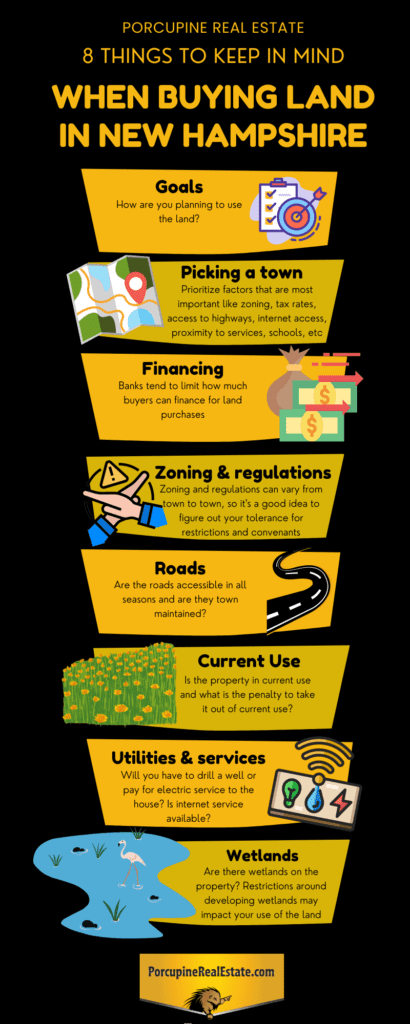Porcupine Real Estate Blog
Thinking of buying land? Read this first [Updated for 2023]

We've lost count of the number of times we've heard from someone wanting to buy land in New Hampshire for recreational purposes, homesteading, farming, or building a home.
While we enthusiastically endorse the idea of property ownership, there are some important considerations worth sharing for folks thinking about buying land
What are your goals?

Before you start seriously looking at land parcels, it’s best to have an idea of how you’re planning to use the land so you can decide how many acres you should look for and how much you can afford.
Will you build a home? Do you want to homestead? Will you use it for recreational purposes only?
You can go as small as a few acres or as big as a few hundred acres. Once you figure out how you plan to use the land, you can take the following factors into consideration.
Picking a town
The first thing you need to do is figure out which towns best fit your needs.
In order to do that, you should prioritize the factors that are most important like zoning, tax rates, access to highways, internet access, proximity to services, and so on.
If you have kids, you might consider their need for a social life and access to schools. Is it important for you to be near a hospital?
Even things like how far you have to drive to get groceries should be considered when purchasing land.
Financing
Typically banks lend only up to 50-70% of the purchase price on land acquisition—fewer options than when buying an existing home.
Many of our clients choose to pay cash (or cash out their cryptocurrency holdings) to avoid the hassle of getting financing.
Zoning & Restrictions
Zoning and building regulations vary from town to town, so you’ll want to read the town’s zoning ordinance (usually online) before completing your acquisition.
You can view a list of towns with no zoning regulations here, which is great if you want to build your own house, especially if it’s non-standard construction.
You should also consider whether the parcel has any restrictions or covenants listed in the deed.
You might encounter restrictions on how you can use the land, what can be placed on the land, and requirements for building on the land.
Local town officials are generally helpful and friendly, so we recommend contacting them directly with questions about building permits and requirements, zoning limitations, and any pitfalls to consider.

Accessibility
Occasionally, you will find the perfect piece of land that is priced more cheaply than other parcels.
But buyer beware; this could be a landlocked property that doesn’t have access to a public road.
While not a deal killer, you’ll need to be aware of what’s involved to get a right of way or easement from the neighboring property owner.
Easements give access to the landlocked property and could be as simple as the neighbors giving you the right to create a driveway that runs on their property and leads to your land.
In order to get the right of way or easement, you’ll need to have a legal agreement that is recorded in the county registry.
Rights of way, on the other hand, allow you to travel across your neighbor’s property, but not to build a driveway or other road or structure on it.
We recommend speaking with a real estate lawyer prior to purchasing a landlocked parcel.
Roads
Don’t forget to look at the type of road the property is on. We recently had buyers fly in from out of state to look at properties with acreage.
One of the properties was located on a class VI road (class VI roads are not maintained by the town) and, while they were aware of the existence of class VI roads, they didn’t realize what they were actually like.
During the tour of properties, they got stuck when their GPS took them down an unmaintained class VI road.
Thankfully, they were able to get themselves out of that situation, but it could have ended very badly.
Road type may also affect the availability of fire/hazard insurance and of financing. And the town may refuse to include the address in its fire department coverage area or may require the installation of a fire sprinkler system in the house.
Don’t forget to consider road maintenance, too. As you get into rural New Hampshire, not all roads are town- or county-maintained.
Make sure you know the costs associated with maintenance like gravel, grading, and plowing.
Other pitfalls & considerations
Some other potential expenses include clearing trees for the driveway and building site and a culvert if the driveway crosses a stream.
Other factors you might want to think about include steep slopes, drainage, flooding, potential wetlands setbacks, natural windbreaks, and more.
Current use
If the land is currently in “current use” status for reduced property taxes, a penalty must be paid to the town when there are improvements done to the property such as a house, driveway, barn, etc.
Our previous post on current use gives a high-level overview of how it works.
Utilities and services
If you’re going to buy raw land to build a house or use for agriculture, you will probably want to have a drilled well for water.
The cost to drill a well can be expensive,; sometimes significantly more expensive than you planned for, depending on various factors including how deep the well has to be dug.
Another consideration is having access to electricity. It can be expensive to run electric power lines down the street to the property.
Our agent, Dominic DeMaria, notes, "Having electricity accessible at the street means there is generally enough infrastructure around the parcel to make it easier to build without too many extra resources.”
Likewise, if you’re going to need a septic system, you’ll have to pay for “perc” tests (for drainage and septic system compatibility) and a septic design/plan by a licensed designer.
Internet service at the home is essential for most people, so you’ll want to check to see if there are cable, DSL or fiber optic lines near the property, and budget for the provider to bring the line to your property.
For more remote locations, Starlink service is available in New Hampshire.

Wetlands
Its important to note that you can’t make physical improvements or modifications to wetland areas in New Hampshire without special permits.
State regulations protect and preserve wetlands, so identifying and delineating any wetlands located on the property can be an essential part of buying land.
State regulation requires that you obtain a permit from the New Hampshire Department of Environmental Services prior to any excavation, removal, filling, dredging, or construction activity in and adjacent to waters of the state, or in wetlands.
Many municipalities have their own regulations regarding wetlands, so you’ll want to do your due diligence to ensure these regulations won’t impact your planned use of the land.
When buying land, you’ll want an experienced agent who knows to include a number of contingencies in the purchase agreement, so you have time for due diligence and investigating things like soil tests, zoning approval or variance, performing a survey, and having contractors give estimates on a septic system and well drilling.
Send us an email to be connected to our land specialist.


Mark – just read and added a property tab on my browser and bookmarked this 👍
Would love to meet your Manchester developer friend – lets definitely get together! or – I can treat at the penthouse at The One Hundred Club overlooking Portsmouth & the Maine waterfront.